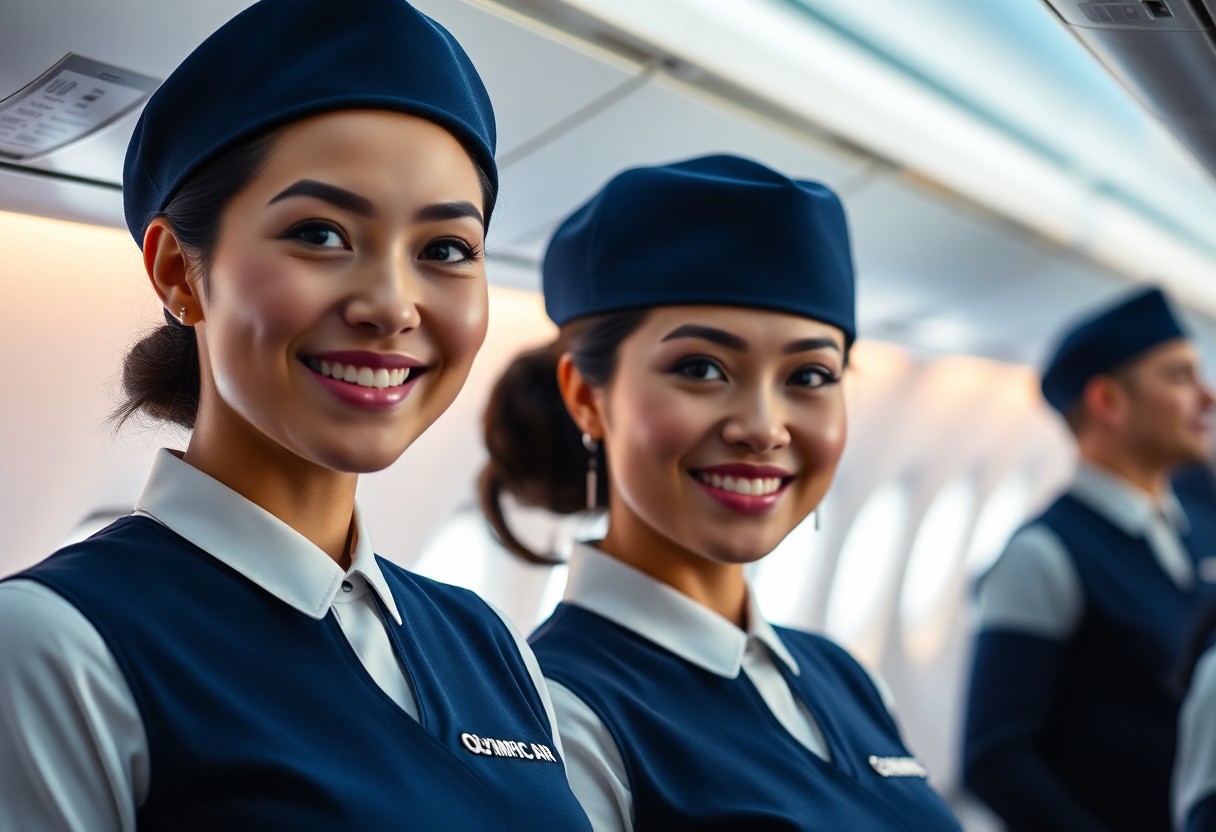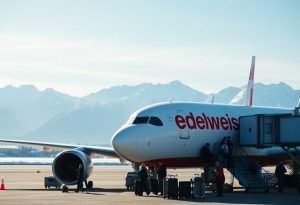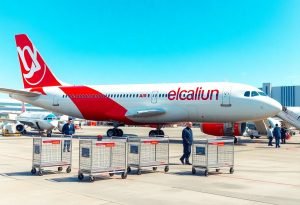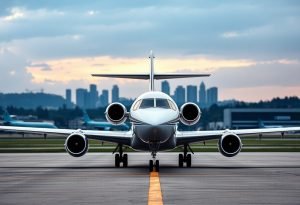There’s a world of opportunities waiting for you as a member of the Olympic Air cabin crew, where you will play a vital role in ensuring passenger safety and comfort. You will be expertly trained to handle various situations, from providing top-notch customer service to managing emergency protocols. This post will guide you through the imperative skills, qualifications, and experiences needed to thrive in this dynamic environment, empowering you to take off on a rewarding career journey.
Key Takeaways:
- Olympic Air cabin crew members are trained to provide excellent customer service, ensuring passenger comfort and safety throughout the flight.
- Safety procedures and protocols are a top priority for cabin crew, including regular drills and training exercises to prepare for various in-flight emergencies.
- Effective communication and teamwork among cabin crew are imperative for a smooth operation, enhancing the overall travel experience for passengers.
How to Become an Olympic Air Cabin Crew
Your journey to becoming an Olympic Air cabin crew member begins with a passion for aviation and a strong customer service background. You’ll need to meet specific requirements such as being at least 18 years old, holding a high school diploma, and maintaining a valid passport. Completing a dedicated application and assessment process will help you demonstrate your suitability for this exciting role where you’ll navigate the skies while ensuring passenger comfort and safety.
Tips for Applying
Assuming you’re ready to commence your application, consider the following tips to enhance your chances of success:
- Craft your resume to highlight relevant experience.
- Practice interview skills to showcase your personality.
- Research Olympic Air to display your knowledge about the company.
Perceiving these steps clearly can give you a competitive edge in the application process.
Factors to Consider When Preparing for Training
Clearly, commenceing on your training requires thoughtful consideration of various factors that can impact your success:
- Physical fitness is necessary for cabin crew responsibilities.
- Emotional resilience helps manage challenging situations with passengers.
- Commitment to customer service aligns with the company’s values.
Any preparation ahead will ultimately guide you through a successful training experience.
Become aware that successful training as an Olympic Air cabin crew member demands a mix of physical and emotional preparedness. You will engage in extensive safety procedures, which can be intense but are vital for ensuring passenger safety. Additionally, honing your customer service skills will encourage a positive environment and showcase your dedication. Balancing these elements effectively will enhance not just your performance but also your confidence throughout your training journey. Any effort you invest during this phase plays a pivotal role in your career advancement.
Tips for Success as Cabin Crew
Now, to excel as a cabin crew member with Olympic Air, focus on the key areas that enhance your performance. Emphasize your communication skills, maintain a positive attitude, and prioritize teamwork. Consider the following tips:
- Be adaptable in different situations.
- Stay calm under pressure.
- Show genuine care for passenger well-being.
- Continually seek feedback and improve.
Recognizing these attributes will help you stand out as an exceptional crew member.
Enhancing Customer Service Skills
Little things matter when enhancing your customer service skills. Focus on active listening to understand passengers’ needs and concerns. Use positive language and maintain a friendly demeanor to create a welcoming atmosphere. Be mindful of, your interactions can dramatically influence the overall travel experience for your passengers.
Managing In-Flight Challenges
Cabin crew must be prepared for various in-flight challenges that may arise. From dealing with difficult passengers to unexpected turbulence, your ability to stay composed is vital. Keeping a clear mind and employing problem-solving skills ensures you can address issues effectively. Building a strong rapport with your team fosters a supportive environment for tackling stressors together, ensuring a safe and pleasant experience for everyone.
The safety and comfort of passengers are always your top priorities, which means that you must be vigilant and proactive. When faced with emergencies, the ability to remain calm is imperative. Understanding how to handle medical emergencies or disruptive behavior can significantly improve outcomes. Your training equips you with the tools to navigate these situations effectively. Additionally, providing positive experiences in those challenging moments can lead to more satisfied passengers and leave a lasting impression of Olympic Air’s commitment to exceptional service.
Factors Influencing Cabin Crew Performance
After analyzing the various aspects that impact the effectiveness of cabin crew, it becomes evident that several factors play a role in shaping your performance. Key contributors include:
- Teamwork
- Communication
- Training
- Passenger Interaction
- Work Environment
This comprehensive understanding allows you to improve your service for travelers and ensures a safe and enjoyable experience for everyone on board.
Team Dynamics and Communication
Cabin crew members operate within a complex environment where teamwork and effective communication are paramount. You must collaborate seamlessly with colleagues to ensure smooth service, handle emergencies, and respond to passenger needs, reinforcing the importance of interpersonal relationships and communication skills.
Adaptability to Different Situations
The ability to adapt to different situations is vital for cabin crew. You will face unpredictable scenarios, from passenger disputes to last-minute schedule changes, requiring quick thinking and a calm demeanor. Your adaptability is imperative in providing exceptional service while maintaining safety standards.
This adaptability also extends to understanding diverse passenger needs and cultural backgrounds, allowing you to interact positively and resolve conflicts effectively. Staying calm under pressure, assessing situations quickly, and making sound decisions will enhance your performance. Each flight presents unique challenges, and your ability to navigate these successfully is fundamental to your role as a cabin crew member.
How to Maintain Work-Life Balance
Keep in mind that achieving a work-life balance as an Olympic Air cabin crew member is vital for your overall well-being. Prioritizing your time between work duties and personal life allows you to recharge and maintain mental clarity, ultimately enhancing your performance in the sky. Establishing boundaries can ensure that you have time for both your professional responsibilities and personal interests, leading to a more fulfilling life.
Time Management Strategies
Some effective time management strategies include creating a detailed schedule that accommodates both your work shifts and personal plans. This may involve using digital tools or apps to remind you of important tasks and prioritize them accordingly. Consider setting aside specific times for rest, family, and leisure activities to ensure that you keep balance in your hectic routine.
Coping with Travel Stress
Coping with travel stress as a cabin crew member can be challenging, but implementing effective techniques can make a significant difference. Management of stress involves staying organized, practicing mindfulness, and maintaining a support system. Ensuring that you have adequate rest, both on and off duty, can reduce fatigue and enhance your mood. This means utilizing layover time for rest and relaxation rather than engaging in extra activities. Surround yourself with positive influences and communicate with colleagues to share experiences and strategies for handling stress, making travel feel less burdensome and more manageable.
Tips for Career Advancement in Aviation
Despite the competitive nature of the aviation industry, there are several strategies that can help you enhance your career as an Olympic Air cabin crew member. Consider the following:
- Focus on developing strong communication skills.
- Seek opportunities for leadership roles, even in small projects.
- Engage in continuous professional development.
- Network actively within the aviation community.
The right combination of these strategies can significantly boost your career trajectory.
Building Networking Relationships
Building connections within the aviation sector is vital to your success. Attend industry events, participate in social media groups, and maintain relationships with colleagues to create a robust professional network. By fostering these relationships, you may uncover valuable job opportunities and gain insights into industry trends.
Pursuing Additional Certifications
The pursuit of further certifications not only enhances your resume but also deepens your understanding of aviation standards and practices. Whether you choose specialized safety training or customer service certifications, these added credentials can set you apart in a crowded job market.
Aviation is an ever-evolving field, and enhancing your qualifications through additional certifications can be immensely rewarding. By investing time in relevant training programs, you will gain expertise that can enhance your passenger service skills and improve safety protocols. In an industry where competitiveness is high, these certifications can significantly bolster your attractiveness to potential employers. Ultimately, by committing to lifelong learning, you increase your opportunities for advancement and position yourself to navigate the complexities of the aviation world with confidence.
How to Handle In-Flight Emergencies
Unlike typical service scenarios, handling in-flight emergencies requires quick thinking and decisive action. As an Olympic Air cabin crew member, you must be prepared to face various potential situations, such as turbulence, medical emergencies, or evacuations. Your training emphasizes the importance of remaining calm and guiding passengers while ensuring their safety. By following established procedures and protocols, you can effectively manage these incidents while maintaining a professional demeanor and providing reassurance to those on board.
Preparing for Emergency Protocols
You must familiarize yourself with all emergency protocols before each flight. Continuous training sessions simulate various situations, ensuring you know the correct actions to take during incidents. Understanding the layout of the aircraft, the location of emergency equipment, and your role in a crisis enhances your preparedness. Staying updated on safety guidelines means you can act swiftly and confidently, significantly improving passenger safety and minimizing risk.
Effective Communication During Crises
Communication is vital in managing in-flight emergencies. You need to convey instructions clearly and confidently to avoid confusion among passengers. Establishing a calm tone helps mitigate panic, encouraging passengers to follow your directives. Maintain eye contact and use simple language to ensure all instructions are understood, considering the diverse backgrounds of passengers on board.
Effective communication builds trust and reassurance during turbulent times. You should prioritize clear and assertive instructions while also addressing passenger concerns with empathy. By displaying a calm demeanor and maintaining open lines of communication, you foster an atmosphere where passengers feel safe and cared for. Strong communication skills not only facilitate order but also promote teamwork among fellow crew members, ensuring a united front in managing the situation effectively.
To wrap up
Considering all points, you can appreciate the dedication and professionalism of Olympic Air cabin crew, who prioritize your safety and comfort throughout your journey. With their extensive training and commitment to excellent customer service, they ensure a pleasant travel experience. By understanding their roles and responsibilities, you can enhance your interactions on board, making your flight more enjoyable. Trust that the cabin crew is there to assist you, catering to your needs and ensuring a smooth flight.
Q: What are the primary responsibilities of Olympic Air cabin crew members?
A: The primary responsibilities of Olympic Air cabin crew members include ensuring passenger safety and comfort throughout the flight. This involves conducting pre-flight safety checks, demonstrating safety procedures to passengers, serving meals and beverages, responding to passenger inquiries, and handling any issues that may arise during the flight. Additionally, cabin crew are trained to administer first aid in case of emergencies and must remain attentive to the cabin environment to provide a secure and pleasant journey for all passengers.
Q: What qualifications do I need to become a cabin crew member for Olympic Air?
A: To become a cabin crew member for Olympic Air, candidates typically need to meet certain qualifications, which may include being at least 18 years old, having a high school diploma or equivalent, and possessing good communication and interpersonal skills. Fluency in both Greek and English is often required, and knowledge of additional languages can be an advantage. Candidates must also pass medical examinations and background checks. Relevant experience in customer service or hospitality can enhance a candidate’s application, although it is not mandatory.
Q: What training do Olympic Air cabin crew members undergo before starting their duties?
A: Olympic Air cabin crew members undergo comprehensive training before they begin their duties. This training typically includes safety and emergency procedures, customer service skills, first aid, and fire safety. New recruits participate in both theoretical and practical training sessions, including simulations of various emergency scenarios. Training also covers the airline’s policies, in-flight service protocols, and cultural sensitivity to ensure crew members can cater to diverse passenger needs. Upon successful completion of training, they receive certification that qualifies them to work on flights.



